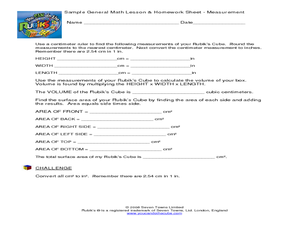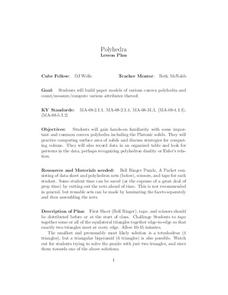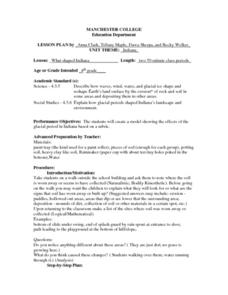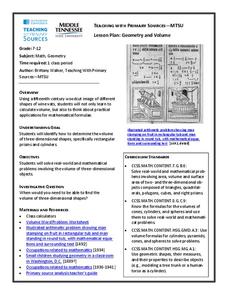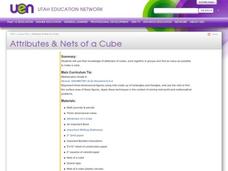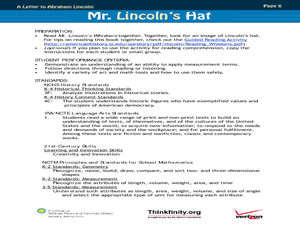Curated OER
Penny's Box
Students need to be able to calculate the volume and surface area of a cuboid as well as present a systematic list of results in order to justify the minimum case. The use of three factors of 100 is also important.
Curated OER
How Does Radon Get In?
Students examine the potential sources of radon entry into homes. They compute the surface area for various objects, create a sketch of their home, calculate the ratio of air leaks to the outside surface area, and conduct a radon audit...
Curated OER
New Boxes from Old
Ninth graders take a rectangular box (e.g., a cereal box) and cut it up to make a new, cubical box with the same volume as the original. In so doing, they will discover that because the cubical box has less surface area than the...
Curated OER
How Does Radon Get Into Your Home?
Students complete an experiment in which they measure the radon level in their home. They examine the different types of units of measurement and practice using them throughout the activity. They calculate surface area on objects as well.
Curated OER
How Does Radon Get Into Your Home?
Students examine their home and calculates the amount of ventilation found. They also compute the surface area of different objects. They determine what is needed to reduce the amount of radon entering the home.
Curated OER
Animal Skin
Students investigate the skin surface to body area ratios for different animals. In this seventh/eighth grade mathematics/science lesson, students explore heat transfer between an animal’s body and the environment. Using...
Curated OER
Measurement
Students measure angles, perimeter, area and volume. In this geometry lesson, students define different ways to measure and solve for the perimeter, area and volume of geometric shapes. They analyze and process information to help them...
Curated OER
Geometry and Spatial Sense
Students investigate geometric shapes in 2 and 3 dimensions. In this geometry lesson, students create a model chocolate factory working in groups and using an actual cake. Students take a quiz about measurement equations...
Curated OER
Water Treatment Plant Tour
Students define vocabulary related to geometry and calculate the volume. In this geometry lesson, students calculate flow rates, and volume as it relates to a water plant facility. They calculate the volume of three dimensional shapes...
Curated OER
Polyhedra
Young scholars analyze convex polyhedra through hands on methods. In this geometrical shapes lesson, students construct paper models of convex polyhedra and identify the different properties including the number of sides, faces and edges.
Curated OER
Volume of Spheres
Students find the volume of spheres. In this geometry lesson, students measure and derive the formula for each shape and solid. They use the correct terminology and units when solving these problems.
Curated OER
Mobius Band
Tenth graders discuss sides of a shape and how to collect data correctly. In this geometry lesson, 10th graders examine shapes and count the surfaces on the shape. They read the history of Mobius Band and relate it to surface area.
Curated OER
Factors That Shaped Indiana
Fourth graders construct a model of Indiana which displays the effects of the glacial period on the state's physical structure. Students work in groups to plan and execute their model based on an established rubric.
Virginia Department of Education
Geometry and Volume
The history of math is fascinating! Utilize a woodcut primary source image from 1492 and posters from the 1930s to help geometers apply their volume-calculation skills to real-life questions.
University of Nottingham
Drawing to Scale: A Garden
See how design and geometry go hand in hand. The activity asks learners to use geometry to design a backyard garden given dimensions of each feature. Scholars work with ratios and scale to develop an accurate scale drawing that includes...
Curated OER
Putting the World in Perspective
Students work in small groups to: make a mental map of the world by tearing paper shapes of the seven continents and locating them on a flat surface in their relative positions, compare their finished mental map to a reference world map,...
Curated OER
Flying Wing
Fifth graders create a flying wing from a pastry tray. In this flying wing lesson, 5th graders understand how the shape of the wind affects flight. Students compare the flying wing to the zanonia seed in nature. Students make changes in...
Curated OER
Making Art That Matters (Printmaking Option)
Learners plan and execute a relief print that attempts to protest or persuade. They focus on effective definition of shape, use of symbols, and impact on their intended viewers.
Curated OER
Wave Math
Students identify the different factors affecting the size and shape of ocean waves. In this math lesson, students calculate wave speed and wavelength given a mathematical formula.
Curated OER
Clay Personality Boxes Lesson Plan
Learners create cut slab boxes from clay using the slip and scoring technique. They impress a surface texture into the clay. Students decorate their box to represent themselves in some way.
Curated OER
Natural Forces
Students assess the damage natural forces have caused Maryland's geographic features. In this state geography and ecology lesson, students work in a group to research ways in which weathering, erosion, and deposition have affected the...
Curated OER
Attributes & Nets of a Cube
Third graders engage in a lesson that focuses on the attributes and forming of a cube. They construct a cube using different combinations while comparing a square with only two-dimensions. Students fold paper while following the...
Curated OER
Me And My Shadow
Students investigate the concept of a shadow. They design a tool to create shadows for an experiment. They make observations and record the size and shape of shadows. The lesson contains background information for the teacher to deliver...
Curated OER
Mr. Lincoln's Hat
Bring out the inner artist with this Abraham Lincoln lesson. Elementary young scholars work on a home project creating a hat similar to Abraham Lincoln's hat. They will use geometry and measurement to create the scale of the hat, then...






